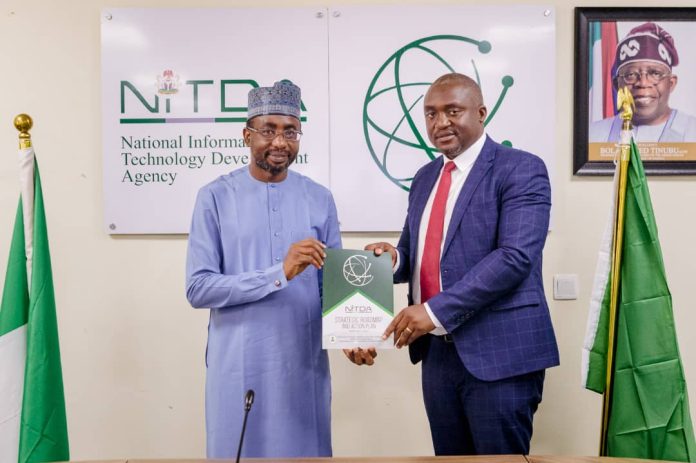A delegation from the Zambian digital economy sector has arrived in Nigeria to study Nigeria’s National Public Key Infrastructure (NPKI), which is under the custodianship of the National Information Technology Development Agency (NITDA).
Led by a Director from the Zambia Information and Communication Technology Authority, Mr. Austin Sichinga, the delegation expressed their interest in Nigeria’s model after comparing various African countries’ approaches. They found Nigeria’s model to be the most adoptable and adaptable.
Mr. Sichinga stated, “We are quite eager to engage and learn as much as we can here. The diversity within our team and the portfolios we have brought indicate the value we place on this project. We intend to implement it for secured transactions and ensure we are moving in the right direction.”
The Director emphasized that the Zambian government aims to embrace digitalization and focus on trade with other partners. He stressed the importance of being ready with services and interactions with partners across borders.
Acknowledging that the implementation of Zambia’s PKI is long overdue, Mr. Sichinga emphasized the need for a continuous border to enhance data exchange and secure platforms across institutions. He added, “The project is long overdue. We must implement it before engaging in conversations about trade and interactions across various platforms within the country and beyond. We are eager to engage and create partnerships to learn from one another.”
In response, the Director General of NITDA, Kashifu Inuwa, commended the Zambian government for their initiative to study Nigeria’s NPKI. He expressed NITDA’s belief that no one succeeds in isolation and emphasized the importance of African countries coming together to develop a digital strategy that transcends boundaries.
Inuwa explained that NITDA has developed a Strategic Roadmap and Action Plan (SRAP) for 2021-2024, with seven strategic pillars, and PKI falls under the Developmental Regulation pillar. He highlighted that NITDA regulates to enable innovation rather than stifle it, considering regulation as any intervention that can influence business, social, or market behavior.
Regarding PKI regulation, Inuwa stated that NITDA is developing regulations because the law that established the Agency empowered it to do so. He clarified that while the Agency has developed the business model, it will not engage in the operational aspect. NITDA will provide the Certificate Authority (CA) route and establish sectoral CAs for different sectors.
Inuwa emphasized the need to commercialize services like digital trust, which would help build trust and confidence in e-commerce. He shared the challenge of Western countries not trusting Nigerian websites due to the lack of certification. The PKI solution would certify these websites publicly, ensuring trust.
The Director General encouraged the delegation to develop policy documents for monitoring and tracking the implementation of PKI and other digital transformation initiatives in Zambia. He mentioned that previous visits from Ghana, Gambia, and Kenya to NITDA have motivated the Agency, as external recognition affirms their progress.
Inuwa disclosed that the Agency is developing a playbook to be shared among African countries, aiming to achieve a strong digital economy for the entire continent. He advised Zambia to initiate approaches that would make them digitally independent and emphasized the importance of building the capacity of their citizens.
During the engagement, the delegation toured NITDA’s facilities, gaining insights into the Agency’s mandates and the management of NPKI by the Cyber Security Department. The presentation highlighted the benefits, architecture, policy, implementation strategy, types of certificates, and stakeholders involved in the NPKI.
The visit concluded with a fruitful exchange of knowledge and experiences, fostering collaboration between the Zambian government and NITDA in the field of digital infrastructure and security.






